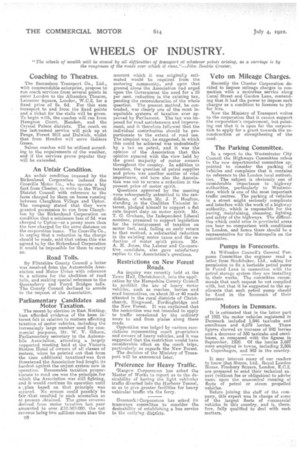Parliamentary Candidates and Motor Taxation.
Page 4

If you've noticed an error in this article please click here to report it so we can fix it.
The recent by-election in Fast Nottingham afforded evidence of the keen interest felt in relation to matters affecting taxation of motor vehicles, including the. increasingly large number used for coin7. mercial purposes, Mr. W. V. Gibson, Parliamentary secretary to the Automobile Association, attending a. largely supported meeting held at the Victoria Station Hotel of owners of all classes of motors, when he pointed out that from the time additional taxationrwas first threatened the Association had fought its hardest against the unjust system now in operation. Peasonalale taxation proportionate to road use was the principle,f or which the Association was still fighting, and it would continue its operation until a ',plan based on that principle was secured. No system could possibly" be fair that resulted in such anomalies as at present obtained. The gross revenue derived from motor taxation last year amounted to over £10500000, the net revenue being two millions more than the
08 amount which it was originally estimated would be required from, the motoring community, and upon that ground alone the Association had urged upon the Government the need for a 25 per cent, reduction in the existing tax, pending the reconsideration of the whole question. The present method, he contended, was clearly one of the most inequitable systems of taxation ever approved by Passliament. The tax was imposed for road maintenance and improvement, and it therefore followed that the individual contribution should be proportionate to the extent of road use. The simplest way, he suggested, in which this could be achieved was undoubtedly by a tax on petrol, and it was the opinion of the Association that this opinion squared with the view held by the great majority of motor owners throughout the country. In addition to taxation, the question of petrol supplies and prices was another matter of vital importance, and here also the Association was out to secure a reduction in the present price of motor spirit.. Questions approved by the meeting were subsequently submitted to the candidates, of whom Mr. J. P. Houfton, standing in the Coalition Unionist interest, pledged himself to support a flat rate import duty on motor spirit. Mr. T. G. Graham, the Independent Liberal nominee, promised to support legislation for the reinstatement of taxation on motor fuel, and, failing an early return to that method, a substantial reduction in the existing motor taxes and the reduction of motor spirit prices. Mr. A. H. Jones, the Labour and Co-operative candidate, also gave satisfactory replies to the Association's questions.








































